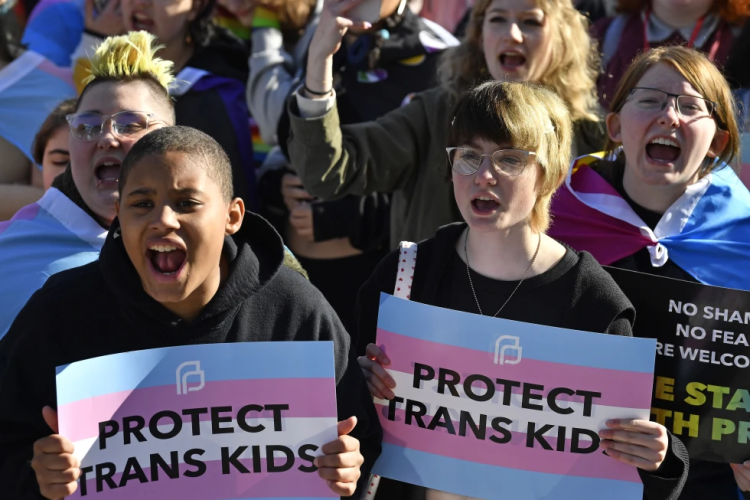In Louisville, Kentucky, the ban on gender-affirming care for young transgender individuals has been reinstated. This decision came after U.S. District Judge David Hale lifted the injunction he had previously issued, which had temporarily halted the restrictions.
As a result of the latest ruling, the prohibition on gender-affirming care takes effect in Kentucky, thereby preventing transgender minors from accessing puberty blockers and hormone therapy.
The lifting of the injunction was praised by Kentucky Republican Attorney General Daniel Cameron, who had requested its removal, while advocates for transgender rights expressed their disapproval of the decision.
“The current developments in the courts concerning LGBTQ+ people are a tragic situation for America, one that will stain the legacy of every judge who enables LGBTQ+ discrimination,” said Chris Hartman, the executive director of the Fairness Campaign, an LGBTQ+ advocacy group based in Kentucky.
Kentucky’s Attorney General Daniel Cameron hailed the recent ruling as a victory for parents and children, expressing gratitude to the judge for upholding the law and protecting Kentucky’s youth.
However, Hartman raised serious concerns about the immediate harm this statewide ban will cause to young transgender individuals and their families in Kentucky. With access to medically necessary care now restricted, they may be compelled to seek treatment outside the state or even relocate entirely.
Judge Hale’s decision to reverse his own order came shortly after the U.S. Sixth Circuit Court of Appeals overturned a similar temporary injunction in Tennessee that halted the enforcement of a comparable law.
The Kentucky case involves seven transgender children and their parents who have filed a lawsuit to block the law. Their argument revolves around the assertion that the law infringes upon their constitutional rights and interferes with parents’ ability to pursue established medical treatments for their children.
Corey Shapiro, the legal director for the American Civil Liberties Union (ACLU) of Kentucky, emphasized that the latest ruling is not the final resolution on the matter. The ACLU considers it a temporary setback and remains confident in achieving a positive outcome before another federal court.
Previously, U.S. District Judge David Hale issued an injunction blocking certain parts of the Kentucky law the day before it was scheduled to take effect. In his ruling, the judge acknowledged the plaintiffs’ strong likelihood of success in their constitutional challenges against the law.
The sweeping transgender legislation was passed earlier in the year by Kentucky’s GOP-dominated Legislature, despite a veto by Democratic Governor Andy Beshear. Governor Beshear opposed the measure, stating that it involved excessive government interference in personal healthcare matters. Notably, Attorney General Daniel Cameron, who is defending the law in his official capacity, is also a candidate challenging Governor Beshear in the closely watched 2023 Kentucky gubernatorial election.
The lawsuit specifically targets sections of the Kentucky law that prohibit the use of puberty blockers and hormone therapy for transgender minors. Other sections related to school bathroom policies, teacher guidance on student pronouns, and teaching about gender identity and sexual orientation were not challenged in this lawsuit.
Across the United States, at least 20 states have enacted laws that restrict or ban gender-affirming medical care for transgender minors, leading to various legal challenges. A federal judge ruled Arkansas’ ban unconstitutional, while federal judges have temporarily blocked bans in Alabama and Indiana. Oklahoma has agreed not to enforce its ban while opponents seek a temporary court order to block it. Additionally, a federal judge has blocked Florida from enforcing its ban on three children who challenged the law.
The states that have enacted laws restricting or banning gender-affirming medical care for transgender minors include: Alabama, Arkansas, Arizona, Florida, Georgia, Idaho, Indiana, Iowa, Kentucky, Mississippi, Missouri, Montana, Nebraska, North Dakota, Oklahoma, Tennessee, Texas, Utah, South Dakota, and West Virginia.









